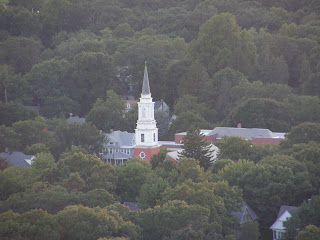The Steeple
I read once several years ago that even among the large segment of the population that doesn't go to church on Sunday mornings, those same people like it that there are churches in their towns and cities and neighborhoods. They believe that the churches do good things in the community, maybe host a preschool or a food pantry or offer some kind of assistance to people who need food or help with their utility bills. They believe that the people in the churches pray and that their prayers are good things for the world - like the people long ago who knew that it was the monks' jobs over at the local monastery to pray for the community. Even if they don't do those things themselves, even if they don't support them with their money. They just think it's good to have churches around, to see steeples rising above the trees in their neighborhoods; they think the community benefits from that. I read this several years ago.
I wonder if that is still true. I wonder if people who don't go to church still think that churches are doing good things in their communities; I wonder if they think that the church people's prayers are good things for the world. It seems to me that that vague monolith "people" might call The Church - because those people don't have a particular singular church or denomination to call their own - is not doing too well in the P.R. department theses days. The Church seems more and more in the public eye to stand for hypocrisy, intolerance, injustice and downright criminality; The Church is known for fighting to keep certain people out (of church altogether or maybe "just" out of the priesthood/pastorate); The Church is known for fostering sexual exploitation and sometimes for working harder to blame others and/or cover it up than to confess and repent of its own sins; the Church is known for fighting one another within the church instead of fighting for the oppressed and the downtrodden in the world.
Back in the Sixties, we were all about sticking it to the man. Since then, we've become the man, most of us, and many of us have come to appreciate that institutions, which we wanted to shout down back then, have a place and function in society that can be positive. Institutions can be the vehicle through which more people can be served better and more efficiently (think how a hospital can serve a community better than a single country doctor with a horse and buggy no matter how good or caring that doctor might be). But we still have that nagging feeling that institutions are just bound to be corrupt, are bound to stomp on the little guy, are bound to become havens for bad actors, are bound to become focused on self-preservation, sometimes at all costs.
It saddens me to know how little most people really know about their local church, about how the people there struggle to understand how to respond to the world's ways - war, consumerism, abuse, power-mongering, worshipping at the altars of money and fashion and power and trivialities. How they struggle to be faithful. About how the church is made up of real people with real problems and real questions and real faith that God is faithful and wants us to be healed and made whole - in a word, saved. Sometimes people need to be saved from church, from church people or church leaders, it's true. But other times people have been saved through church, through church people - that's true, too.
I still like to see those steeples rising above the trees. They represent something to me that is still precious, still worthy. The steeples are still a sign to me that people can know where to come to gather and struggle together to find meaning, so that they can be healed themselves, so that they can go out and live out the Gospel in their communities. I know I'm not alone in this sentiment. But I fear that many have consigned the church to a place of irrelevance, and I can see why.
We all need to go out there and be the face of the church in a world that does not know the church any more. Do good, be kind, live out the Gospel, be love. Not for the institution but for God's beloved people.

Comments